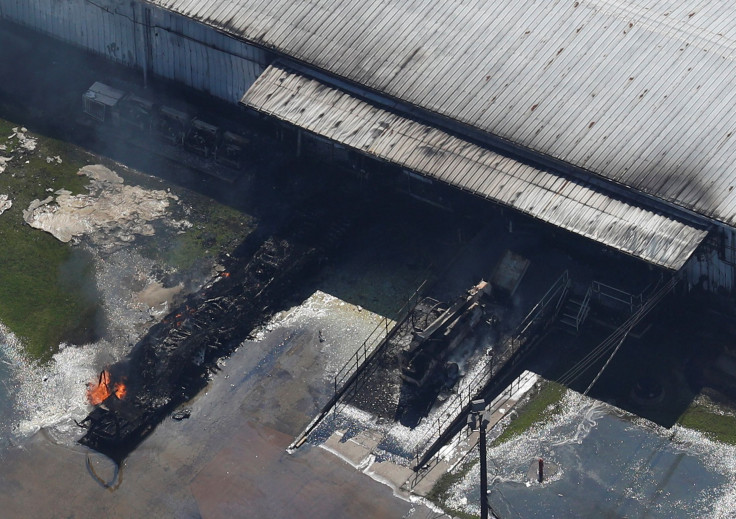Court Rejects Environmental Groups' Attempt To Block EPA’s Delay Of Chemicals Rule

As nearby residents fled the area surrounding an exploding Arkema S.A. chemical plant in the flood-ravaged Houston suburbs, a federal court effectively approved the Environmental Protection Agency's delay of rules designed to strengthen chemical facility safety measures. The ruling was a win for Arkema and its lobbying group, which had successfully pressed officials in President Donald Trump's administration to block the regulation, and for the broader chemical industry, which has bankrolled the campaigns of top Republican lawmakers.
Arkema is already benefiting from the rule's delay: In a teleconference on the crisis Friday, the company refused to release a map of its facilities or an inventory of the potentially hazardous chemicals at the beleaguered plant, as would be required by the heightened safety standards. The company argued that disclosing such information to the public could put the company at risk of terrorism threats, the Houston Chronicle reported. Under both federal and state law, the firms can elect to disclose such information, or not to.
Less than four months ago, Arkema pressed the EPA to repeal the chemical plant safety rule, criticizing the rule's provisions that require chemical companies to disclose more information to the public. In a May 15, 2017 letter to the EPA, Arkema's legislative affairs director wrote that “new mandates that require the release to the public of facility-specific chemical information may create new security concerns if there are not sufficient safeguards to ensure that those requesting the information have a legitimate need for the information for the purposes of community emergency preparedness.”
Unbelievable: @Arkema_Inc is refusing to release its Tier II chemical inventory or it's facility map. Citing terrorism threat.
— Matt Dempsey (@mizzousundevil) September 1, 2017
Trump’s Environmental Protection Agency Administrator Scott Pruitt used the same national security rationale in his March decision to review, and therefore delay, amendments to the agency’s Risk Management Program, an amendment to a part of the Clean Air Act that would boost transparency and safety at plants at risk of spewing harmful chemicals into the air of nearby communities. (The EPA once again delayed it in June, pushing implementation to Feb. 2019.)
Even as the disaster unfolded in Texas, the D.C. District Court of Appeals rejected the environmental groups’ argument that by pushing off the rule’s implementation, the EPA “ignores the serious consequences of delaying essential emergency preparedness provisions” and denies “vulnerable fenceline communities” access to crucial information on hazardous chemicals, according to court documents obtained by IBT.
Gordon Sommers, an associate attorney representing the environmental groups that sued the EPA in June over the rule’s delay, said the court’s approval of the delay was “unfortunate.” He also disputed the notion that greater transparency made Arkema and other chemical companies more vulnerable to terrorist attacks, citing the importance for first responders to know exactly which chemicals they’re going to be dealing with in cases like that of the Crosby plant.

“It’s disgraceful that the administration has delayed these rules,” said Sommers, whose non-profit organization, Earthjustice, is representing the Sierra Club, the Union of Concerned Scientists and Air Alliance Houston, among others, in their legal battle against the agency. The explosion at Arkema’s Crosby plant, he said, “shows more than ever that there’s a need for the rule, for better preparation.”
Sommers said the court ruling was not all bad news for environmental groups, as the judges opted to expedite the groups’ overall lawsuit to keep the EPA from further delaying the rule.
In a statement to IBT, Michael Abboud, a spokesperson for the EPA — which announced Thursday that it was monitoring the situation at the plant, was assisting emergency personnel and found “no concentrations of concern for toxic materials” at the scene — said the rule would not have fully taken effect until 2021, and therefore its delay had no impact on the situation in Crosby. He denied that an explosion had taken place, describing the situation as a fire, despite reports contradicting that characterization. And while the Arkema plant in Crosby faced a $90,000 fine from the Occupational Safety and Health Administration for “serious” hazardous chemical-related safety violations in February, Abboud said the facility faced “no recent EPA [Risk Management Program] enforcement actions.”
Sommers called the EPA’s claim that the rule’s delay did not affect the likelihood or emergency response to the hazardous explosions at the Crosby plant “a lie,” as agencies commonly give industries time to adjust the technologies they use to comply with an new rule, along with intermediate deadlines for piecemeal compliance. If the Risk Management Program amendments hadn’t been pushed back, he said, things might’ve gone differently at Arkema.
When asked by IBT to comment on the crisis in Crosby and its involvement in the delay of the EPA Risk Management Program rule, a spokesperson for Arkema sent documents showing the firm's previous comments on the regulation, addressed to EPA officials, calling for it to be changed or repealed. As far as the situation at its Crosby plant, the Arkema maintained via press release Thursday that it had “followed its hurricane preparation plan” ahead of Tropical Storm Harvey’s landfall and “had redundant contingency plans in place.”
In the wake of a deadly 2013 fertilizer plant explosion, former President Barack Obama issued an executive order amending the EPA’s Risk Management Program to require chemical companies to boost emergency preparedness, provide better information access for nearby citizens who’d be impacted by a chemical plant disaster and improve prevention measures.
Pruitt, who fought the rule as Oklahoma attorney general and was part of a group of Republican governors that partnered with the industry in an effort to demolish the Clean Air Act last year, selected Nancy Beck, the former policy director of the lobbying group American Chemistry Council, to head the branch of the EPA that oversees enforcement of regulations of harmful chemicals.
Arkema — along with the American Chemistry Council, of which the French chemical giant is a member — has waged an aggressive campaign to change the regulations in the industry’s favor, as IBT reported.
In May 2016, Arkema sent a letter to the EPA describing the rule as overly burdensome. In January, the American Chemistry Council and other industry groups wrote Congressional leaders a letter urging them to kill the rule by way of the Congressional Review Act, which lets lawmakers repeal recently-passed regulations by a simple majority vote. In first quarter of this year, the Council directly lobbied the EPA on the issue.
About a week after the chemical industry organizations sent the letter, Rep. Markwayne Mullin (R-Okl.) introduced a House resolution disapproving of the rule. Its cosponsors included Texas lawmakers who represent districts in and around Houston, including Brian Babin, whose district houses Arkema’s flame-spewing Crosby plant.
Sommers rejected the idea that the newly-amended rule is too burdensome for industry compliance, and emphasized the importance of monitoring the more than 12,500 plants in the U.S. with chemical storage above regulatory thresholds.
“I think anybody who reads the rules would frankly have a hard time believing that, because it’s a very, very common-sense, market based regulation,” he said, adding that the Obama administration was essentially “going after the lowest of the low hanging fruit” and that “the rule that the epa adopted is hardly some draconian regulatory scheme.”
© Copyright IBTimes 2024. All rights reserved.






















